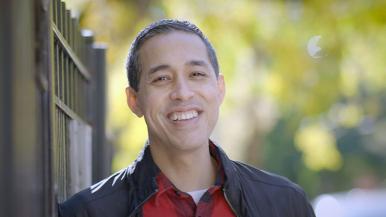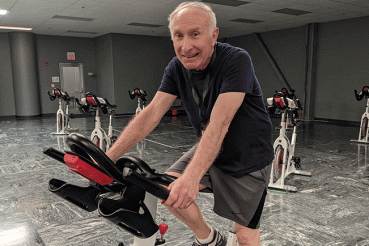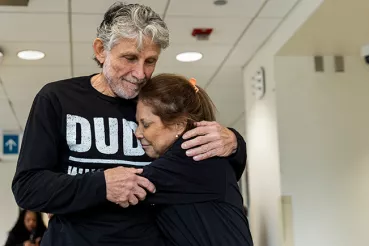There was a point in my life where I thought there was no bigger waste of time than mental health therapy. This was at the beginning of my time with post-traumatic stress disorder, or PTSD. I was home, free and able to pursue my dreams. I had PTSD, and the only thing that was going to help me live with that fact was the one thing I refused time for. There was work, money to be made, schooling to be done, tests to prepare for, study groups to run, family to hang out with and, most importantly, the time I needed to unwind.
When I did try therapy, I came out of it feeling worse. I went in forewarned that my symptoms would increase in intensity before they lowered. What I was not prepared for was how affected I was going to be as I began to speak about what ailed me. Because of this, I ended up doing treatment sporadically. I thought it must be the treatment that was making things worse when the reality was, as it has been for the past 15 years, it was the PTSD. This is akin to cleaning a wound, the initial pain can be overwhelming at first, but if you stick with it, you will find with time and healing a lessening of your distress. If you leave it alone, then what may end up happening is an infection that could threaten your life.
It took years for me to know what I should have done back then. What could have saved me from so much suffering that I would feel later in life was to focus on treating my PTSD. As I began mental health treatment and became better acquainted with my pains, in how to measure them and, most importantly, in how to file them away in my head, this was when I could see the sorry mass of human flesh that I had become. I was driven much more by the past; my present perspective was skewed so much by the memories and revved up emotions that I could not even act in a way that was respectful of who I was at my core. There is a way to reach into that hurt part of yourself, recognize it for what it is, and what it means in your life. I was not able to do this on my own. It required the help of so many others, and guess what? Those other people are there for you too. They are a part of the Road Home Program, the Warrior Care Network, the Wounded Warrior Project and almost any other therapy program out there.
'Healing was possible'
I was able to get better because of the time and effort I put not only into myself and my family but also by the time I spent in healing the part of myself that became so warped from the traumas of my past. This was only able to be done by recognizing what was helping me get to a better place — what others saw was moving me to a more balanced center and allowed me the strength to be as vulnerable as I am now. Because of that vulnerability, I have found a sense of myself that I had not known for a long time. The Sergio who other people held in high regard, the man others could come to love, and, most importantly, a personal perspective that allowed space for compassion for my pain. This did not come easily nor unbidden. I am who you are now seeing in large part because I embraced the most human parts of myself and radically accepted my current situation.
People sometimes speak that the harder thing to do is to carry on, work, feed your family or focus on anything other than yourself. What I found when I attempted to bury myself in my ambitions was that I instead began to avoid my thoughts, emotions and perspectives my mind brought up to protect me. The hardest thing I have ever had to work on was not fighting in a war; it was instead in steeping myself in the reality my mind was seeing and working on recalibrating my perspective. This was not easy simply because what I suffered from was equivalent to road rash. The protective skin was gone, and the naked open wounds were exposed and ready to react to anything that provided the slightest provocation.
The pain was immediate and the thoughts overwhelming, but with help, I began to see healing was possible and that who I knew myself to be was always going to be there. I just needed help in being guided back to who I was and what tools I could use to be myself.
'Push forward'
The Road Home Program continues to help me in being able to do that. If you are a veteran, please give them a chance. If you are a civilian suffering from the myriad of other mental health illnesses, then I ask of you the same — get help. Do not wait. Do not hesitate. Push forward, and fight for who you know yourself to be.
There is one last analogy I wish to leave you with in hopes to elucidate further what mental health therapy is. If you have done physical therapy, you can understand you are not going to be able to do everything you want on that first try. You will meet many failures and will have to push yourself to find out how to reach that next plateau. Mental health treatment is the same. As you work on it, you will be able to find what your new normal can be and what you can potentially work toward. It is possible, but it will not come about if you do nothing about it. You will more than likely find things become worse as you avoid that which pains you. So why not take the leap of faith? Know that more pain will come at first but with time and hard work, you will see results that can lead you to one day be able to see the love in your family members’ eyes and take it in for what it is rather than what your past is interpreting of it.
I can at least say now I am in a place I would never have imagined myself being in the past — working in a full-time career, owning a piece of property, saving for retirement and being this open and frank about what has happened to me over the years. I understand I should give credit to myself, but it is hard to do that when all I can see is what others have been able to do for me. In the end, I was a part of a team that ended up working together to bring about an opportunity for me to heal and grow. Thank you, Road Home Program, Home Base, Wounded Warrior Project and the VA, for aiding me in being able to get some of my life back.
Sergio Alfaro is an Army veteran and Epic technical trainer at Rush University Medical Center.




